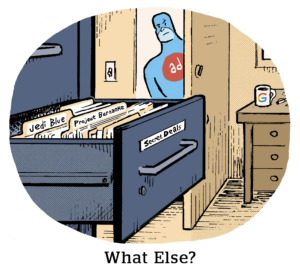 “Data-Driven Thinking” is written by members of the media community and contains fresh ideas on the digital revolution in media.
“Data-Driven Thinking” is written by members of the media community and contains fresh ideas on the digital revolution in media.
Today’s column is written by Alan Chapell, president at Chapell & Associates.
The arms race between consumers and advertisers goes back as far as I can remember. The battle rages on with the myriad of ad-blocking tools available.
Disabling advertising for ad-supported media is something that many in our industry are increasingly concerned about. The IAB could not be more clear on this point: “Ad blocking is stealing.”
Today, however, there’s a new threat to ad-supported media that might be even more significant than ad blockers.
Apple is making significant changes to its Identifier for Advertising (IDFA) in iOS10. Starting this month, when iOS10 users enact “limit ad tracking,” Apple will depreciate the IDFA by returning a series of zeros instead, preventing any entity that relies upon the IDFA from pseudonymously identifying the user. The net effect is Apple is enabling iOS10 users to effectively opt out of advertising.
There’s a whole bunch of ramifications of this decision on the digital advertising marketplace. But before I address those, let’s revisit the issues that Apple was seemingly trying to address when it initially launched IDFA.
Back in 2013, the mobile app marketplace suffered from what I’ll characterize as the Unique Device Identifier (UDID) problem. Cookies didn’t work in the mobile app space. Tracking and attribution identifiers were unreliable, lacking in transparency and didn’t offer privacy choices to consumers. Apple stepped in and offered IDFA, which was hailed as being akin to a mobile app “cookie” offering both tracking and privacy controls. And the mobile app marketplace has flourished in part as a result of Apple offering this tool.
IDFA’s advertising and privacy controls were analogous to those offered by cookies. But Apple’s recent move to depreciate IDFA only serves to highlight a key distinction between cookies and mobile ad identifiers: Cookies are an open-source technology. Any company that wants to can use cookies without paying a toll. Cookies are an imperfect technology, but at least they provide a level of consistency.
Conversely, Apple owns the technology behind IDFA and can therefore impose rules around how IDFA gets used. Now that type of arrangement can also work well – assuming that Apple acts as a benevolent dictator and doesn’t impose rules for the sake of advancing its own business objectives.
Apple’s position regarding advertising isn’t exactly a secret. The company has for a long time been at best indifferent and at worst hostile to the advertising ecosystem. The issues I see with this change is that it breaks legitimate advertising models, forces companies to use more intrusive tracking methods and doesn’t necessarily improve user privacy. Perhaps most importantly, Apple’s move breaks the implicit promise Apple made to the marketplace many years ago that IDFA would support legitimate business models. That seems like a high price to pay.
Apple will undoubtedly claim the high road here. It will argue it is offering privacy choices to consumers. But the net impact of this decision is likely to be larger app store commissions for Apple by pushing apps toward paid models and a greater reliance on the large digital identify arbiters. So let us at least recognize that this might not be an entirely altruistic move.
There’s a number critical issues at stake here. As we move towards an internet-of-things-enabled world, is it a good thing for ad-supported media to be throttled by a small number of companies that can change the terms of any marketplace on a whim?
Is it fair for Apple to offer a platform at the urging of the Federal Trade Commission and then turn around and dramatically change how that platform may be used because that puts it in better position to compete with the other internet giants? Pushing the marketplace toward paid content and away from advertising simultaneously helps Apple and hurts Facebook and Google.
Back to my initial question: Do consumers have a right to opt out from advertising? But let’s be honest here: That’s exactly the functionality Apple is offering here. Enacting “limit ad tracking” in iOS10 also limits the ability of advertisers to understand how many ads are being viewed. I don’t believe there’s much debate about whether advertisers are less likely to pay for ads they can’t measure. In my view, Apple has crossed a line here.
Apple’s move here demonstrates exactly why addressability should not be under the total control of any single entity. Maybe Apple thinks that what it is doing will move the marketplace in a direction that is favorable to its model. It’s my view that the marketplace will recognize this move for what it is.
Follow Alan Chapell (@chapell68) and AdExchanger (@adexchanger) on Twitter.













